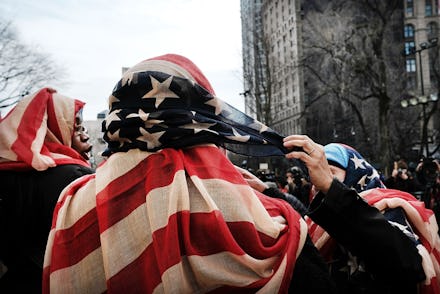New study: 60% of Muslims in the US report religious discrimination in the past year

Muslims living in the United States have often found themselves at the center of national debate. But their voices are seldom heard.
A new study from the Institute for Social Policy and Understanding, a social science research institute, finally offers the public an accurate depiction of Muslim life in Trump's America.
The study, released on Tuesday, found that a total of 60% of Muslims living in the U.S. have experienced some form of religious discrimination in 2016. The study also found that Muslim women (68%) are more likely than Muslim men (55%) to report religious discrimination in the last year. In addition, the report found Muslims are more than twice as likely as Jewish, Catholics and Protestants to be stopped at the U.S. border for additional screening.
ISPU's study also found that Muslims expressed fear that the result of the 2016 presidential elections emboldened white extremists: About 38% of Muslims expressed fear over their family's and own personal safety from white supremacist groups.
And the discrimination and violence trickles into the playground and classroom, as well. According to the study, about 42% of Muslims with children reportedly religiously-motivated bullying. One in four of these bullying incidents reportedly came from a teacher or school official.
Dalia Mogahed, director of research at ISPU, said what she found most surprising about the findings of the study is "the level of trauma" Muslims are enduring as a result of Trump's presidential win and his election campaign.
"What I find the most surprising is the level of trauma the Muslim American community is feeling is in result of the 2016 elections," Mogahed said. "I was surprised by how many people were feeling that their own personal safety were being threatened by white supremacists."
The fear is understandable. The political and social realities surrounding the lives of Muslim Americans is front and center, on the heels of an intense legal battle over President Donald Trump's Muslim ban, as well as, a recent TSA ban on electronic devices larger than cellphones on ten airline carriers from eight Muslim-majority countries. In February, the U.S. Customs Border Protection agency discriminated against Muslim and "Muslim-sounding" travelers by revoking their global entry cards without explanation. The Trump administration has also invited anti-Muslim activists, some of which the Southern Poverty Law Center labeled as members of hate groups, into the White House for policy briefings and meetings.
Beyond the political environment — Islamophobic attacks are the highest they have been since 9/11. Since the beginning of the election cycle, the country has seen an exponential spike in anti-Muslim hate crimes. Six days after election night, the FBI announced that it recorded a 67% increase in anti-Muslim hate crimes in 2015. Just a month ago we saw a string of arson attacks on mosques and death threats sent to Islamic community centers across the country.
Mogahed said ISPU's study provides a rare comprehensive look into the attitudes of the Muslim community in the U.S., one often not conducted by even major data and polling firms. It also dismantles some of the falsehoods and fake news about Muslims, such as Dearborn, Michigan, being a terrorist breeding ground or claiming that Muslims are inherently more violent towards women, that are often curated by right-wing conservatives and regurgitated by the Trump administration.
"[The report] also provides facts at a time when there's a war on truth and a war on facts when fake news is oft and normal," Mogahed added. "This report replaces that with evidences. It really couldn't be more timely to represent to publish a report on this on a very emotional debate with evidence."